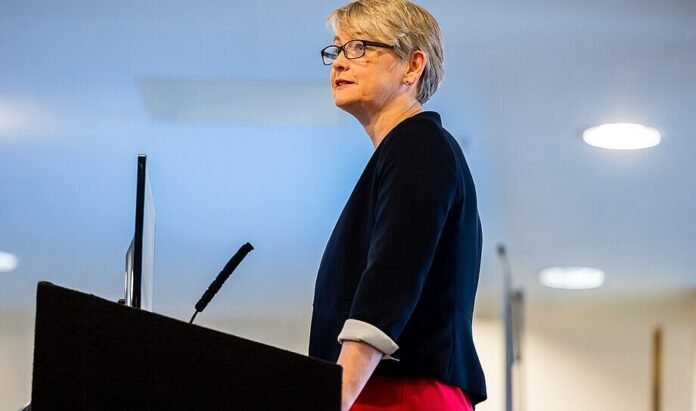Home Secretary moves to label direct action group as a terrorist entity following RAF base attack
Home Secretary Yvette Cooper has announced plans to ban the activist group Palestine Action under anti-terror legislation, following their latest attack on a UK military base.
The move would make membership or support of the group a criminal offence, carrying a sentence of up to 14 years in prison if Parliament approves the proscription order next week. Cooper described the group’s actions, including breaking into RAF Brize Norton and spray-painting military aircraft, as “disgraceful” and a threat to national security.
Speaking in the Commons, Cooper said Palestine Action had escalated in both frequency and severity since 2024, targeting defence firms, charities, and government buildings with what she characterised as acts of serious criminal damage. “This government will not tolerate those who endanger our national security,” she declared.
While hundreds demonstrated in Trafalgar Square ahead of Cooper’s announcement, police made 13 arrests after scuffles erupted. Protesters were originally set to gather outside Parliament but were barred under a special exclusion zone.
Cooper was clear that the decision applies solely to Palestine Action and not to peaceful protestors or other pro-Palestinian groups. “It is vitally important that peaceful protest remains protected,” she said.
Palestine Action responded defiantly, calling the government’s move “unhinged” and “plainly preposterous.” In a statement, the group claimed its members were ordinary citizens — including teachers, nurses, and parents — using disruptive tactics to protest the UK’s role in arming Israel’s military. “We are not terrorists,” the group insisted, adding that it had instructed lawyers to challenge the ban.
The group’s most high-profile actions include a 2022 break-in at Thales’ Glasgow defence factory, causing over £1 million in damage, and more recent attacks on Elbit Systems UK in Bristol and Instro Precision in Kent. Last Friday’s breach at RAF Brize Norton triggered a counter-terrorism police investigation.
Armed Forces Minister Luke Pollard condemned the break-in as “epically stupid” and a direct attack on national security. He confirmed red paint had been thrown on two RAF Voyager aircraft but said operations at the base remained unaffected. “This must never happen again,” he told MPs, adding that security across UK defence sites had since been tightened.
Embed from Getty ImagesWhile the Labour frontbench strongly backed Cooper’s move, dissenting voices have emerged. Former Scottish First Minister Humza Yousaf called the proscription “a shameful abuse of anti-terror legislation,” accusing the government of silencing dissent. Labour MP Nadia Whittome warned of a “dangerous precedent,” arguing future governments could use similar powers against critics.
However, Chancellor Rachel Reeves backed the home secretary, saying: “Damaging military and privately owned assets is unacceptable, whatever your views on the Middle East.”
On the streets of London, police enforced strict conditions. Officers cordoned off Charing Cross and imposed a 3pm cutoff for the protest. Thirteen arrests followed, with charges ranging from assaulting emergency workers to racially aggravated public order offences and obstructing police.
The protest saw demonstrators waving Palestinian flags and chanting: “We will not be silenced.” One supporter of the group called the plan to outlaw it “absurd.”
Met Police Commissioner Sir Mark Rowley defended the restrictions, saying the force would “robustly” enforce legal boundaries on protests, even if it had no power to stop them outright.
If Parliament backs Cooper’s draft order next week, Palestine Action will join the list of proscribed groups alongside ISIS and Boko Haram, marking an extraordinary escalation in the government’s response to anti-Israel direct action campaigns.
THE GUARDIAN
Author Sally Rooney criticises the UK government’s plan to designate Palestine Action a terrorist group after activists spray-painted military planes in protest of UK support for Israel’s war in Gaza. She contrasts this with Israel’s killing of 23 Palestinians at an aid site the same day, arguing that one act involved lethal violence, the other, property damage – yet only the latter is being treated as terrorism. Rooney accuses the UK of supporting Israel’s military campaign despite UN and Amnesty findings suggesting possible genocide. She warns that proscribing Palestine Action could criminalise not only membership but even verbal support, threatening free speech. Rooney defends civil disobedience in the face of state-sanctioned violence, noting that protest groups like the suffragettes and anti-apartheid activists also broke laws. She argues that when peaceful protest fails, civil resistance becomes morally justified. The government’s use of terrorism laws, she says, dangerously expands to include non-violent dissent, setting a repressive precedent amid growing public opposition to UK complicity in the Gaza conflict.
THE TELEGRAPH
Palestine Action activists clashed with police in Trafalgar Square after being banned from protesting outside Parliament. The protest, sparked by the government’s proposed proscription of the group as a terrorist organisation, drew dozens of demonstrators condemning UK arms sales to Israel and its role in the Gaza conflict.
The government had imposed a last-minute restriction on protests within a half-mile of Parliament, citing security concerns. Defying the order, protesters threw red paint on landmarks and police vehicles, symbolising Palestinian bloodshed. Nine arrests were made during confrontations with officers.
A spokesperson for Palestine Action called the ban “an attack on democratic rights” and vowed continued resistance. Civil liberties groups warned that the move risks criminalising non-violent dissent.
The protest follows widespread outrage over Israeli strikes on Gaza, including the killing of 23 civilians at an aid site. Critics say branding Palestine Action as terrorists while ignoring state violence in Gaza reveals a dangerous double standard in UK policy.
